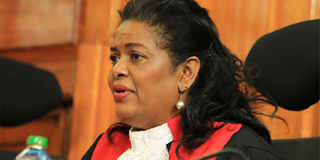Ruling reveals a court beset by disagreements

Lady Justice Njoki Ndung'u at the Supreme Court before delivering a full judgment on reasons for nullification of President Kenyatta's re-election. PHOTO | JEFF ANGOTE | NATION MEDIA GROUP
What you need to know:
The dissenting judges accused their colleagues of being obsessed with processes at the expense of the material import of the election.
But Justice Njoki Ndung’u sought to dismantle all these assertions in a 440-page ruling she read in full for four hours.
The Majority ruling had said the Independent Electoral and Boundaries Commission failed to conduct the election in accordance with the Constitution and relevant laws.
The sharply divergent decisions of the September 1 ruling, which were expounded on Wednesday, have offered a glimpse into a deeply divided court.
The judges were clearly worlds apart in their philosophical orientation.
Supreme Court judges Njoki Ndung’u and Jackton Ojwang faulted their colleagues Chief Justice David Maraga, Deputy Chief Justice Philomena Mwilu, Justices Smokin Wanjala and Isaac Lenaola for nullifying President Kenyatta’s win in the August 8 poll on.
The dissenting judges accused their colleagues of being obsessed with processes at the expense of the material import of the election.
The Majority ruling had said the Independent Electoral and Boundaries Commission failed to conduct the election in accordance with the Constitution and relevant laws.
PRESIDENTIAL RESULTS
The judges said IEBC did not transmit presidential results (or forms 34A) from polling stations nor provide all forms 34A as a means to verify forms 34B which contain constituency tallies.
The majority ruling also cited a number of anomalies which include the lack of security features on some forms 34, and the commission’s refusal to comply with the Court’s ruling to provide access to their server and access logs.
It further ruled that the Kenya Integrated Election Management System (Kiems) — which is used to identify voters and transmit results — was modified without reference to all the candidates.
But Justice Njoki Ndung’u sought to dismantle all these assertions in a 440-page ruling she read in full for four hours.
She said she had conducted an analysis of the 291 forms 34B — 290 constituencies and one from the diaspora — and the disputed forms 34A and found that they were okay.
AFFIDAVITS
She also insisted that affidavits from the respondents had addressed all the questions raised and that in any event any anomalies which could have occurred were not enough to upset the results to justify the landmark ruling.
The import of IEBC vs Maina Kiai and others’ Appellate Court ruling in June which made votes counted at the polling station final is another point of departure between the two sides.
While the majority ruling argued that the precedent did not absolve IEBC chair Wafula Chebukati from the duty of verifying the results by counterchecking results in forms 34A, the dissenting judges agreed with the respondents that the presidential returning officer could not do much.
The majority and dissenting judges also differed sharply on the doctrine of precedent which broadly urges judges to pay proper respect to past judicial decisions.
“Although the doctrine of precedent does not stand in the way of progressive interpretation of the law, this power must be used in a sparing and cautious manner to guarantee continuity, certainty and adaptability,” Justice Ndung’u ruled.
BURDEN OF PROOF
The Supreme Court was departing from its 2013 decision in which it had established that the burden of proof in an election petition lies with the petitioner.
This is in line with the general rule in civil cases.
The court, however, appeared to have been alive to the fact that the IEBC was the custodian of all relevant records relating to the election and agreed with the petitioner that the commission had something to hide by disobeying a court order requiring them to open ups its systems for scrutiny.
Even on this Justice Ndung’u differed saying “the court did not give orders for the petitioner to access the first respondent’s servers but only access the read-only copy information since the commission’s integrity had to be protected.”
And while the September 1 ruling has been roundly termed as daring seeing as it is only the fourth such decision in the world, Justice Ndung’u appears to have been keen on the wider ramifications of any adverse ruling on the stability of the State.
CONSTITUTION
“Every arm of Government has the unique role of defending the Constitution, the Bill of Rights and the sovereignty of the people.
‘‘The essence of a system of checks and balances is to ensure that when one constitutional branch threatens the entire schematic ordering of the Constitution and the State, the other is ready to check these actions,” she ruled.
She warned that having been part of the inaugural Supreme Court and “having steadily and consistently settled the law on elections, the interpretation of Section 83 by the Majority will unleash jurisprudential confusion never before witnessed.”
Questions have, however, arisen as to at what point Justice Ndung’u scrutinised the contentious documents to which she gave a clean bill of health, and why she did not call her colleagues’ attention to them.




